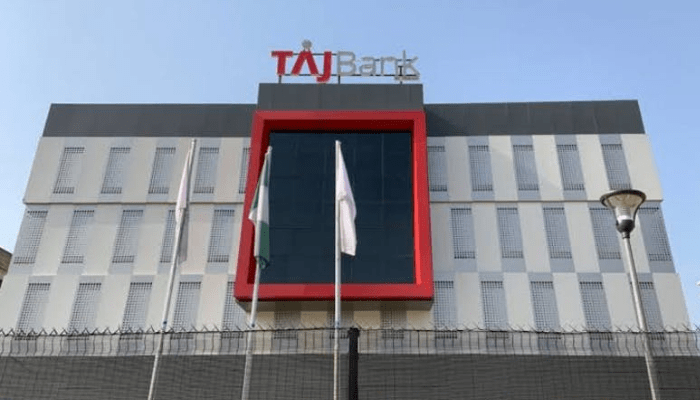TAJBank Limited, Nigeria’s rapidly growing non-interest financial institution, has announced that its N20 billion Sukuk issuance was oversubscribed by an impressive 185.5 per cent, underscoring investors’ increasing confidence in the bank’s ethical banking model and its strategic role in Nigeria’s Islamic finance sector. The result marks another milestone in the institution’s expansion plans and demonstrates strong market appetite for Sharia-compliant financial instruments in the country.
The Sukuk, which represents the second series under TAJBank’s N100 billion Sukuk Issuance Programme, attracted subscriptions worth N57.1 billion, far exceeding the initial target of N20 billion. The issuance, which closed in late September, is being celebrated as one of the most successful private Sukuk offers by a Nigerian financial institution in recent years.

According to the bank, the oversubscription reflects investors’ trust in its stability, transparency, and consistent performance, even amid the challenging macroeconomic environment. The Managing Director and Chief Executive Officer of TAJBank, Hamid Joda, described the outcome as “a powerful endorsement of the market’s confidence in the TAJBank brand and the growing appetite for non-interest financing in Nigeria.”
“We are delighted by the overwhelming response from institutional and retail investors,” Joda said. “The 185.5 per cent oversubscription speaks volumes about the strength of our investor relations and the market’s recognition of the positive impact of our innovative non-interest products.”
Joda added that the proceeds from the Sukuk would be deployed toward financing key infrastructure and developmental projects across critical sectors such as agriculture, real estate, energy, and manufacturing, consistent with the bank’s mandate to promote inclusive economic growth through ethical finance.
The Sukuk instrument, structured in compliance with Islamic finance principles, offers investors an opportunity to earn returns without engaging in interest-based transactions. The funds raised will be channelled into asset-backed ventures that contribute directly to Nigeria’s real-sector development — a core tenet of non-interest banking.
TAJBank’s Executive Director, Sherif Idi, noted that the success of the issuance validates the bank’s financial strategy and its strong governance structure. He said, “The overwhelming investor interest demonstrates confidence in TAJBank’s business model and long-term vision. It also highlights the growing understanding of Sukuk instruments as viable alternatives to conventional bonds in Nigeria’s evolving capital market.”
The Sukuk issuance, arranged by TAJ Capital Limited as the issuing house, attracted wide participation from institutional investors, pension fund administrators, insurance companies, asset managers, high-net-worth individuals, and retail investors. Analysts say this level of participation signals a positive shift in Nigeria’s investment culture, as more investors embrace Sharia-compliant instruments as part of a diversified portfolio.
Non-interest banking, once considered a niche segment in Nigeria’s financial ecosystem, has gained remarkable traction in recent years, driven by regulatory support and rising demand for ethical finance. The Central Bank of Nigeria (CBN) and the Securities and Exchange Commission (SEC) have both implemented policies to deepen the Islamic finance space, encouraging innovation and inclusion.
Financial experts have commended TAJBank’s achievement as a testament to the growing maturity of Nigeria’s Islamic finance industry. According to Dr. Bashir Abdullahi, an Islamic finance scholar, the oversubscription reinforces the idea that ethical finance can thrive in an economy seeking stability and sustainability. “This development shows that investors are looking for responsible investment opportunities that support real economic growth, not just speculative returns,” he said.
Dr. Abdullahi further observed that the success of TAJBank’s Sukuk could encourage other financial institutions to explore non-interest financing as a way to mobilise funds for development-oriented projects. “With the right framework and investor education, Sukuk can become a major tool for financing Nigeria’s infrastructure deficit,” he added.
Established in 2019, TAJBank has emerged as a pioneer in Nigeria’s non-interest banking landscape, operating on a model that prioritises shared prosperity, ethical investment, and risk-sharing. The bank, which has expanded rapidly across major Nigerian cities, continues to record steady growth in deposits, profitability, and customer base.
In its 2024 financial report, TAJBank recorded a 300 per cent growth in total assets, further solidifying its position as one of the fastest-growing financial institutions in West Africa. The bank has also been recognised with multiple industry awards for innovation, transparency, and customer service excellence.
The recent Sukuk success adds to a growing list of achievements that have positioned TAJBank as a reference point in Africa’s Islamic finance sector. By mobilising funds toward productive ventures rather than speculative investments, the bank is not only reinforcing its commitment to ethical finance but also contributing to Nigeria’s broader economic diversification agenda.
Market observers believe that the overwhelming subscription to the Sukuk reflects rising investor confidence in the country’s financial markets, even amid persistent economic headwinds. “This level of oversubscription shows that investors are still optimistic about Nigeria’s long-term growth potential, particularly in sectors aligned with sustainability and real economic value,” said Professor Kemi Ajayi, an economist at the University of Abuja.
As TAJBank prepares for future Sukuk series under its N100 billion programme, the institution has reaffirmed its commitment to deepening financial inclusion and providing Nigerians with access to innovative, non-interest-based financial products. Joda emphasised that the bank would continue to explore avenues that support economic empowerment and sustainable development.
“With this successful issuance, we have once again demonstrated that ethical finance is not just an alternative — it is the future of responsible banking,” he stated. “We remain focused on building a stronger, inclusive, and resilient financial ecosystem that serves both investors and the wider economy.”
Support InfoStride News' Credible Journalism: Only credible journalism can guarantee a fair, accountable and transparent society, including democracy and government. It involves a lot of efforts and money. We need your support. Click here to Donate
